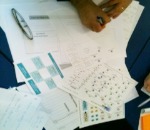Over the last 4 years we have developed a range of tools, resources and activities. Each has been created to help those involved in creating a course to identify, reflect on or solve issues associated with its design, planning and/or writing. Each is, therefore, a ‘tool’ that can be used as is or reversioned for your context.
To create these tools we have drawn on existing academic, theoretical and practitioner research, existing tools, and the experience of the pilots themselves. Furthermore, they have been trialled both internally at the OU and externally across several other universities. In total over 200 staff have attended OULDI workshops where these tools and we have interviewed over 100 individuals. Many more have tried them at conferences, individually or in other contexts supported by the projects. Conseuqently, the tools have gone through several iterations and evolved over time.
Our aim has been to help provide a selection of tools that an individual or team who are involved in curriculum design can chose from. Not every person will necessarily need to use the same range of tools, nor in the same order, however, we do expect these tools to prove useful to an individual or team as part of the ‘toolbox’ that they create.
We have tried to build a sample toolbox of the tools and resources we have encountered. Though primarily drawn from the OULDI work, this does also include related tools and resources produced by others working in the Learning Design field.
Tools
The OULDI project has developed a suite of tools to be used in learning design. This includes:
| CompendiumLD: software for creating and designing visual representations of a learning design. Support material includes an introductory sheet and videos, two tutorials and reference sheets. | |
| Cloudworks: a social networking website used by indivduals and communities of practice for sharing and discussing learning and teaching ideas and designs. | |
| Course Map: a template for creating an ‘at a glance’ representation view of a course or module (in paper or Excel formats) | |
| Pedagogical Features Card Sort: around 45 cards to help module teams decide on and describe their course (available online in Wallwisher or as standard printable cards) | |
| Pedagogy Profiler: a tool for analysing the distribution of pedagogies used in a module (in paper and Excel formats) | |
| Information Literacies Facilitation Cards (OU): sets of cards relating to different academic levels that will help effectively integrate 4 information literacy skills areas into modules or programmes. |
A full list of items collected in the OULDI toolbox can be found in OULDI Toolbox in Cloudworks webpage. It includes links to other tools developed in other learning design projects such as:
| Pheobe pedagogical planner | |
| Learning Design Support Environment tool (LDSE) | |
| Co-genT | |
| more |
“I always think that the qualities of a good tool are that it can be used with very little instruction; you do not think about or question the tool when using it; it helps you know when you have successfully completed a task and finally you want to use it again. I found this all to be true of the OU tools” – Workshop participant
Activities
 Activities have been designed to facilitate ‘learning about learning design’ and/or stimulate design diaglogue. They can be used as part of a learning design workshop or by individuals or groups engaged in the design process. All activities have an output and an indication is given for how long each activity would usually take. Three guided pathways have been developed to support those who would like more structure: a learning design ‘lite’ format called ‘Using technologies in teaching’, the Design Challenge and a Masters level OER (being completed).
Activities have been designed to facilitate ‘learning about learning design’ and/or stimulate design diaglogue. They can be used as part of a learning design workshop or by individuals or groups engaged in the design process. All activities have an output and an indication is given for how long each activity would usually take. Three guided pathways have been developed to support those who would like more structure: a learning design ‘lite’ format called ‘Using technologies in teaching’, the Design Challenge and a Masters level OER (being completed).
Resources
Useful sources of support and advice related to learning design. For example:
| Learn about Learning Design Guide, | |
| Seven top-tips for Design, | |
| Getting started with CompendiumLD guides, walk-throughs and videos | |